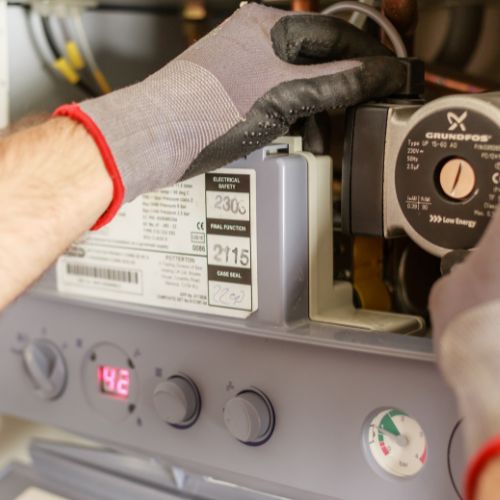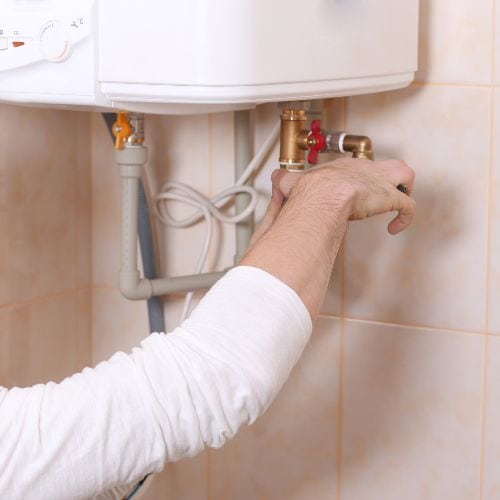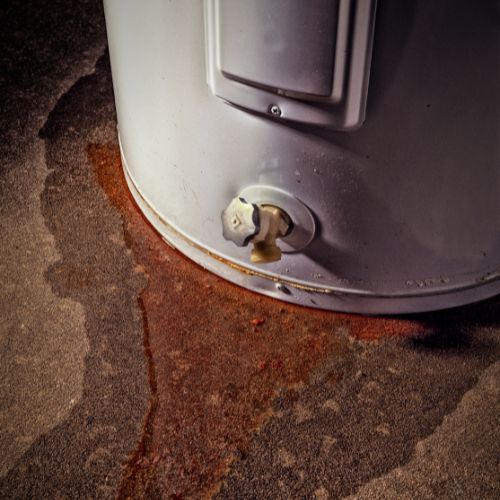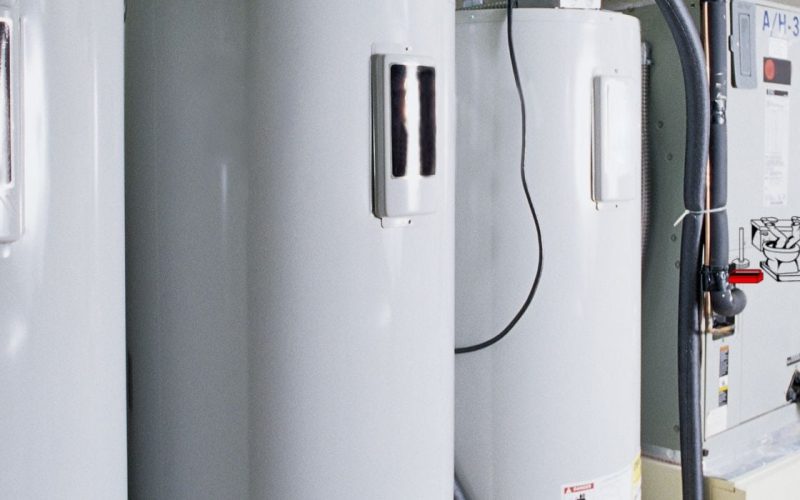If you’re like most homeowners, you’ve had your water heater for years and take it for granted. It’s one of those appliances in the house that’s just always working as long as you don’t have any plumbing issues.
Unfortunately, water heaters can sometimes fail in the blink of an eye, leaving you without hot water! Knowing how long a water heater should last and understanding basic maintenance steps can save you a world of trouble down the road.
In this article, we’ll look at how long a water heater should last and what kind of maintenance you need to keep yours running efficiently throughout its lifetime.
The Basics of Water Heater Lifespan
The basics of water heater lifespan are all about maintenance and proper care. The better care you take of your water heater, the longer it will last.
On average, a tank-style water heater can last anywhere from 8 to 12 years. That’s assuming you keep the elements clean and maintain its temperature settings properly, as well as comply with local safety regulations for water heaters.
Tankless-style water heaters tend to last much longer than tank varieties and are ideal for people who don’t want to worry about frequent replacement costs. A good quality tankless unit can last up to 20 years or more depending on how well it is maintained over time.
Building codes in many cities dictate that all new construction must include a combination type of hot water heater which combines both the heating methods of tankless and conventional types offering convenience, longevity and energy efficiency.
Factors That Impact the Life Expectancy of a Water Heater

One of the biggest factors affecting the life expectancy of a water heater is the amount of maintenance and care you give it. Taking good care of your water heater will make sure it will last for years to come. Regular preventive maintenance, flushing out sediment, and spotting leaks can help ensure that your water heater keeps running smoothly.
The age and type of your water heater also play a huge part in its life expectancy. Older storage tank models usually last between 8-12 years while newer tankless models have an expected lifespan of up to 15-20 years. On average, heaters powered by electricity tend to outlast gas or propane-powered heaters due to their lower temperature requirements.
Finally, geographical location is also a factor when it comes to determining how long should a water heater last. Harder water means more sediment buildup, which can damage internal components more quickly than soft water regions. Additionally, hotter climates require more cooling cycles for hot water tanks than cooler climates do, resulting in shorter lifespans for people living in those areas.
What is the Average Lifespan of a Water Heater?
The average lifespan of a water heater is around 10 to 15 years. However, this can vary greatly depending on the type and quality of your unit, as well as its maintenance levels. Lower-quality units tend to last 5-8 years, while tankless models may last up to 15-20 years or longer if properly maintained.
Regular maintenance is essential for extending the lifespan of any water heater — keep it clean from debris and build-up, inspect the pipes and connections regularly, perform a yearly flush out of the sediment and mineral build-up inside, and always check for signs of wear and tear. If you notice any leaks or damage developing in your water heater, it is best to call a professional immediately so they can properly assess whether repairs or a full replacement is necessary.
How to Extend the Life of Your Water Heater

If you want your water heater to last as long as possible, there are several steps you can take to do so. First, routinely inspect your water heater for any signs of rust or corrosion, as these can signal that you need a new one. Make sure to check the temperature/pressure relief valve, too.
Second, drain sediment from the tank every few months. Over time, sediments will collect at the bottom of the tank and can eventually damage it if not taken care of. To clean it out, drain a quart or two from the hot water outlet pipe located near the bottom of the tank.
Thirdly, wrap insulation around your water heater if it’s located in an unheated space like a garage or basement. This will help keep heat trapped inside and make your water heater more efficient. Additionally, consider replacing worn-out components such as heating elements and thermostats, which can also help extend its life expectancy.
Tips for Regular Maintenance
Regular maintenance is key to extending the life of your water heater. Here are a few tips for keeping it in top shape:
• Check the temperature/pressure relief valve regularly and make sure it’s working properly.
• Flush out sediment from the tank every few months.
• Wrap insulation around the tank if it’s located in an unheated space.
• Replace worn-out components such as heating elements and thermostats.
• Check for signs of rust or corrosion.
• Have a professional inspect the unit every few years to make sure it’s in good working order.
• Make sure to follow the manufacturer’s instructions for proper maintenance and use.
Signs Your Water Heater Is Starting to Fail
A water heater’s lifespan varies depending on the type you have and the maintenance it gets. Knowing what signs to look for can help you determine when it might be time to replace your water heater.
One common sign that your water heater is starting to fail is an increase in monthly energy costs. An older, inefficient water heater will require more energy to keep up with household demand and this cost will add up over time.

Rusty water, loud noises, and wet spots around the tank are also indications of age-related problems with your system. Rusty water indicates that corrosion is happening inside the tank, which can ultimately cause leaks or other damage if left unchecked.
Loud noises when the system is running suggest that mineral buildup has occurred within your tank, leading to an inefficient unit that needs replacing sooner rather than later.
Finally, continual moisture surrounding the tank may mean a leak somewhere inside or out of the unit, which can lead to major property damage if not addressed quickly.
Signs That It’s Time to Replace Your Water Heater
When it comes to how long a water heater should last, many people overestimate the life expectancy. A traditional tank-style water heater usually lasts between 8 and 12 years, with some models going up to 15 years. Knowing what signs to look out for can help you determine if your water heater is starting to fail and needs replacing.
One sign of a failing water heater is loud noises coming from the unit. These noises may sound like rumbling or popping, which are caused by sediment built-up in the tank over time. The sediment creates hotspots that can cause these sounds and will eventually reduce the efficiency of the unit over time.
Another sign can be a decrease in hot water supply or pressure. If you notice that it takes longer for hot water to flow from your taps, or if there’s diminished levels of hot water pressure compared to previously, then your water heater may need servicing or replacing due to age-related wear and tear.
Finally, rust on or around your water heater is an indication that corrosion has begun inside it’s tank and is likely due for replacement soon.
Maintenance Tips for Prolonging Your Water Heater’s Life
If you want your water heater to last as long as possible,
FAQs
How long can a water heater last after replacing the thermocouple?
Replacing the thermocouple can extend the life of your hot water heater. This small metal probe is a vital part of protecting your home from serious damage due to gas leaks. The thermocouple senses the heat level in the pilot flame and signals if it is too low, shutting down the gas flow so that no explosive fumes are released.
How long does a gas water heater last?
When it comes to gas water heaters, the typical lifespan is usually around 8-12 years. However, this lifespan can vary greatly depending on factors like whether or not regular maintenance is done, if the water heater is energy efficient, and where the water heater is located.
How long does a 50-gallon water heater last?
When it comes to how long a water tank of a 50-gallon water heater will last, the answer depends on what type of water heater you’re using. Electric water heaters tend to last around 10-15 years, while tankless water heaters can last up to 20 years or more. Gas-powered models are typically more efficient and can last even longer—up to 30 years!
How long does a 40-gallon water heater last?
The average lifespan of a 40-gallon water heater is 8 to 12 years without sending out cold-water, depending on usage and maintenance. To achieve this long life, proper care and maintenance is critical. Inspect the tank regularly for signs of sediment build up or corrosion, both of which reduce its lifespan. It’s also important to flush the water heater at least twice per year and use specialized cleaners to remove any sediment that has built up within the tank.
What is the life span of an electric water heater?
The typical lifespan of an electric water heater is 10 to 15 years. However, other factors such as the quality of the installation, the maintenance and upkeep of the unit, and environment can play a role in how long your water heater lasts.
How long are the traditional form of water heaters supposed to last
Traditional water heaters are supposed to last anywhere between 8 and 12 years. This is dependent on a few factors, including size, location, quality of construction and the type of heater used. For example, tankless water heaters are known to generally have a longer lifespan than tanks.
Should I replace my 15-year-old water heater?
If you have a 15-year-old water heater and it’s still functioning, it may be tempting to just keep using it. However, water heaters have a limited lifespan, so you’ll need to decide if replacing your old one is the right move.
Should I replace my 20-year-old water heater?
Replacing a 20-year-old water heater is typically a wise decision. As water heaters age, they become less efficient and more prone to breakdowns. Investing in a new one can save you money each month on energy costs and prevent any unexpected expenses from repairs or replacements.



